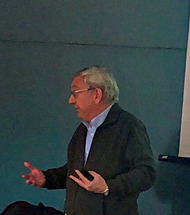2019_03_20_tantaka_angel_iriarte
Ángel Iriarte: "More than 7,000 families ask us for financial aid every year".
The episcopal delegate and director of Cáritas Diocesana de Pamplona-Tudela gave the session "Exclusion here and now", within the cycle of volunteer activities social organized by Tantaka.

PHOTO: Courtesy
Ángel Iriarte is Episcopal delegate and director of Caritas Diocesana de Pamplona-Tudela since 2000. On March 11, he gave the session "Exclusion here and now", within the cycle of social volunteer activities organized by Tantaka. His message is clear: "If we want a fair and inclusive society we must consider a different society from the one we have; if the aspiration is to have more and more and not be willing to give, we will not achieve anything".
What does it mean to live in poverty?
The term poverty is very relative. It is not the same to be poor in Chad as in Spain. In Europe, a distinction is made between relative and severe poverty. We understand relative poverty to be that in which the income is less than 60% of the median (in Spain this would mean that a person earns less than €8,500 a year, and less than €17,500 if it is a family unit of 4 people) and severe poverty is that in which the income is less than 30% of the median.
What about exclusion?
When we talk about exclusion we refer to economic, relational and staff. It may be that a person who is not in poverty status is at risk of exclusion because he/she does not relate to others.
In Navarre, what is the poverty rate at the moment?
It is the community with the lowest poverty rate. It is an autonomous region with a Economics that works in general terms and has a lot of social coverage. In fact, it is the only Community in which those who have been living for two years, even without papers, can have a guaranteed income. In case of having minor children, this income can be obtained after only one year.
Has status changed in recent years?
From 2000 to 2008, poverty and exclusion rates in Navarra were quite low. When the economic crisis began in 2008, poverty skyrocketed, reaching 2013 with the worst rates of the 21st century. That year there were 95,000 people on the poverty line and 20,000 people in status of severe poverty. Until 2016 improved the status but currently from Caritas we perceive that we are increasing the attentions.
And what needs have been emerging?
In the world of exclusion, we point to two problems: housing and mental health. In the last year, 53% of the people assisted lived in a room occupied by more than one person, and mental health problems are increasing among people in social exclusion. But, undoubtedly, the biggest problem is the lack of work.
What people come to Caritas to ask for financial aid?
From the beginning of the crisis until 2016, more people of Spanish nationality came to Caritas; however, since 2016, more foreigners have been receiving assistance. Without going any further, in 2018 69% of the people assisted were of foreign nationality.
In terms of sectors, in which ones is there greater poverty and exclusion?
The most excluded and unprotected sector of the population is the one that does not have access to an income and has been living in Navarre for less than two years, or one in the case of having children. In Pamplona we perceive that there are two neighborhoods where poverty and exclusion are more evident: Echavacoiz and La Milagrosa.
How does Caritas manage the needs of these people?
Every year we receive 7,000 family units, but all we can do for many people is to inform and advise them. There is another much smaller sector to which we can offer an economic financial aid or alleviate some problem and finally there is an even smaller group that receives accompaniment, so that they can improve their lives and if possible get out of exclusion. The latter is what we believe to be the main function of Caritas.
Is it possible to get out of poverty?
Yes, but it is very difficult. And the longer a person has been in poverty status, the more difficult it is. There is a factor that often goes unnoticed, which is the intergenerational transmission of poverty. Exclusion and poverty are inherited, so that someone born in this situation status is very difficult to get out of it. In order to facilitate this exit, all agents must operate: government services and aid, entities such as ours, neighbors and family... It has to be a work at network.
What would you say to young people to make them aware of this status?
The first thing is that they should go through life with their eyes open, since many times things go unnoticed because they are not attentive. Secondly, that making a more just society is everyone's task: no one is going to come and fix things, it must be us. If we want a fair and inclusive society we must consider a different society from the one we have; if the aspiration is to have more and more and not be willing to give, we will not achieve anything.

